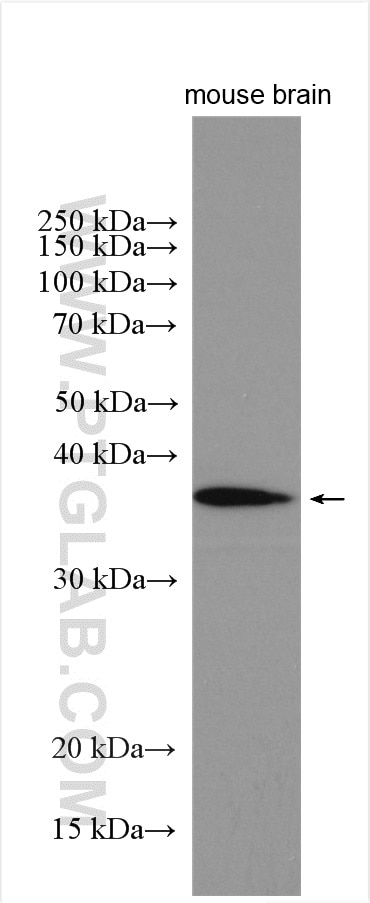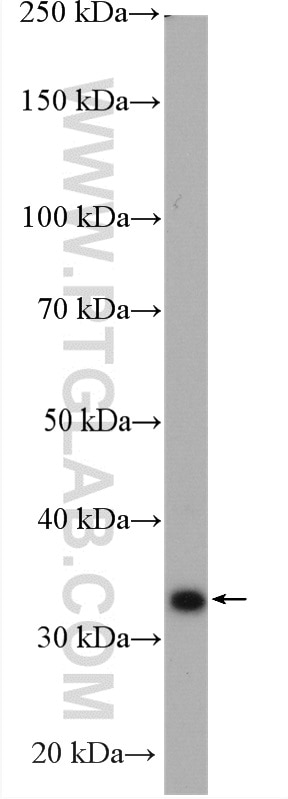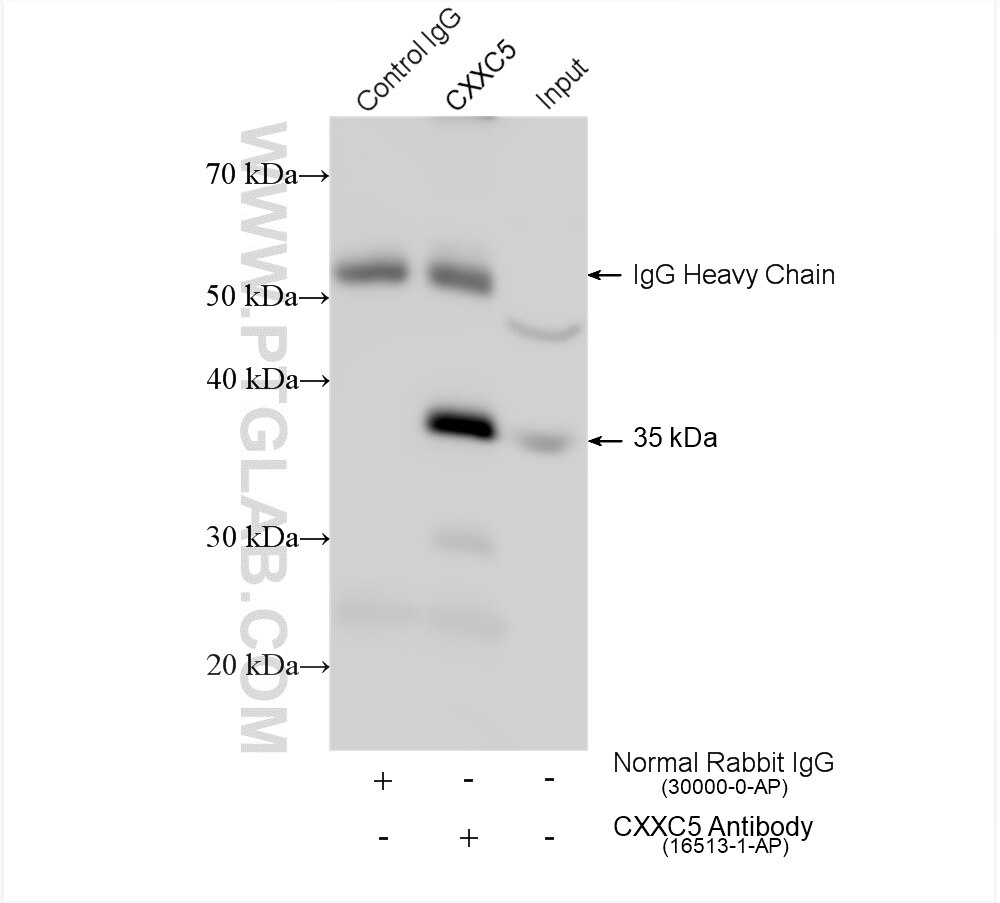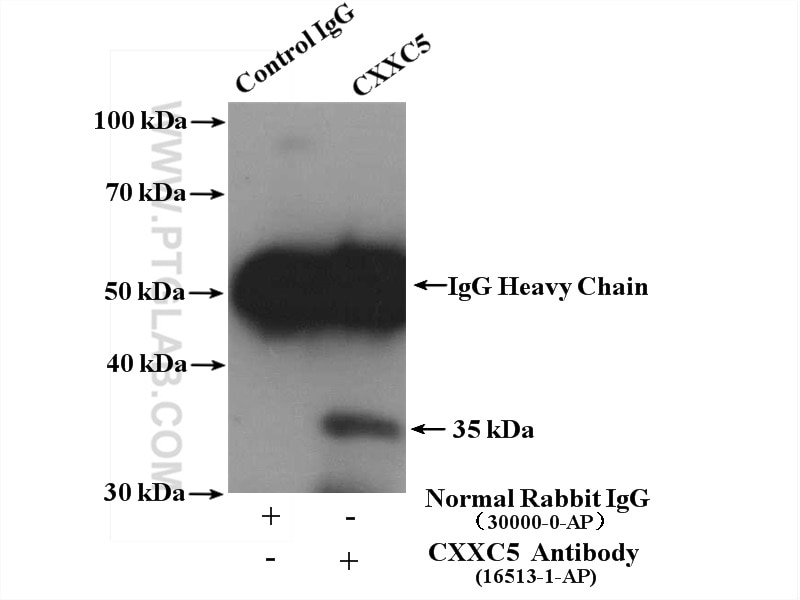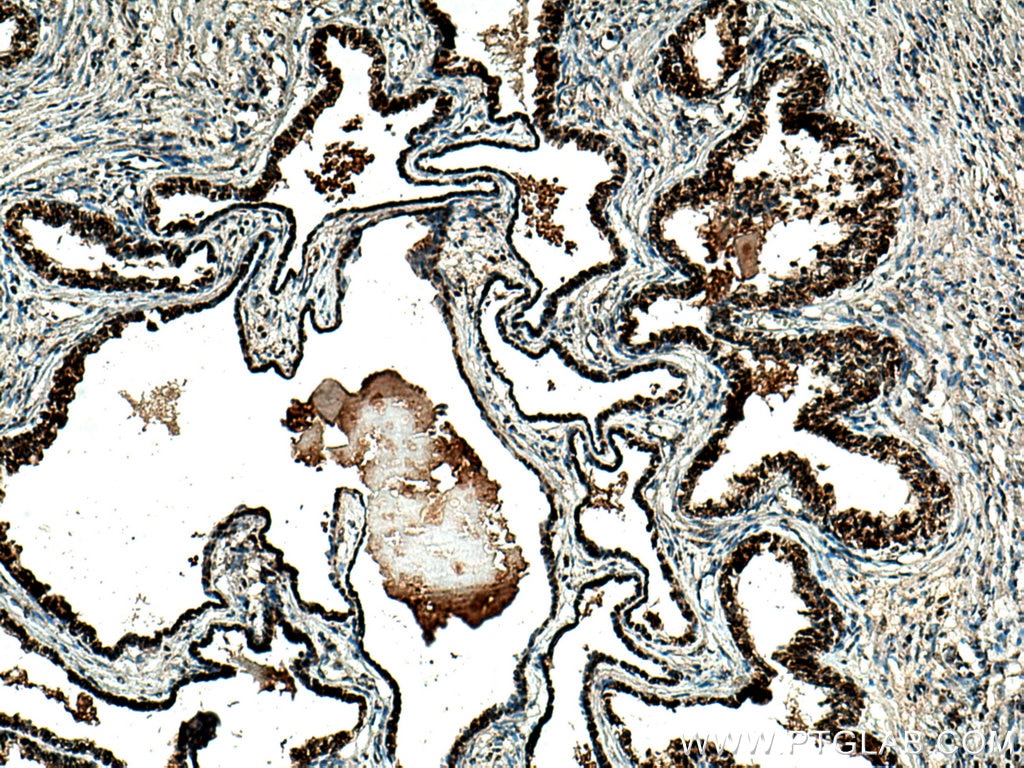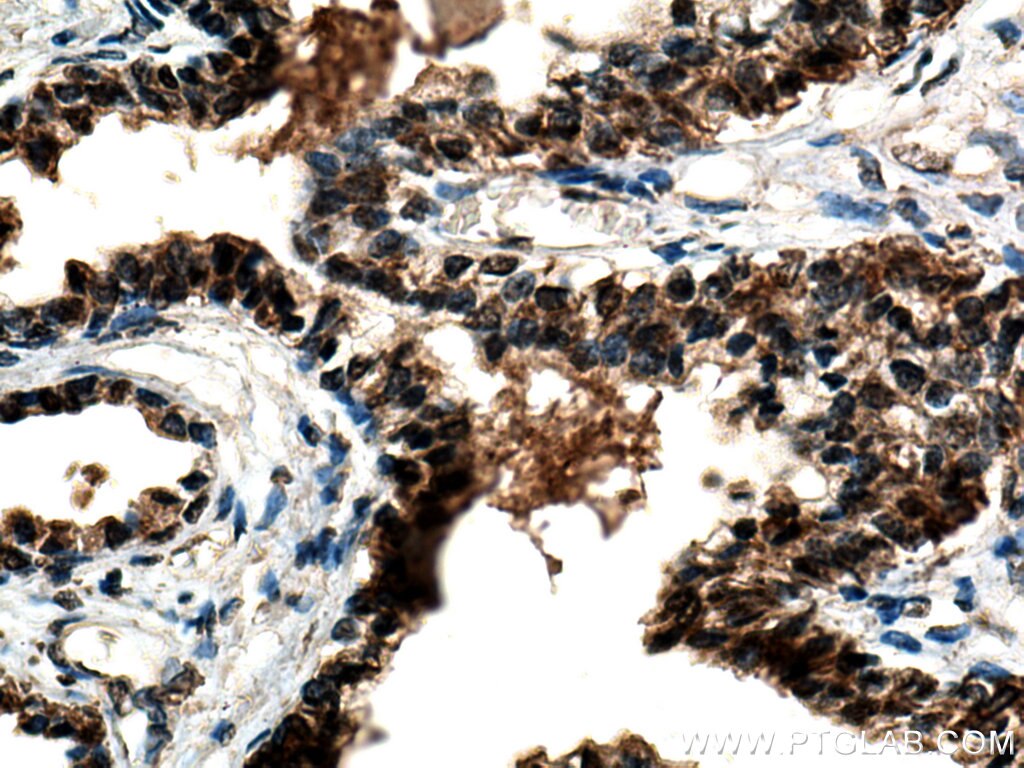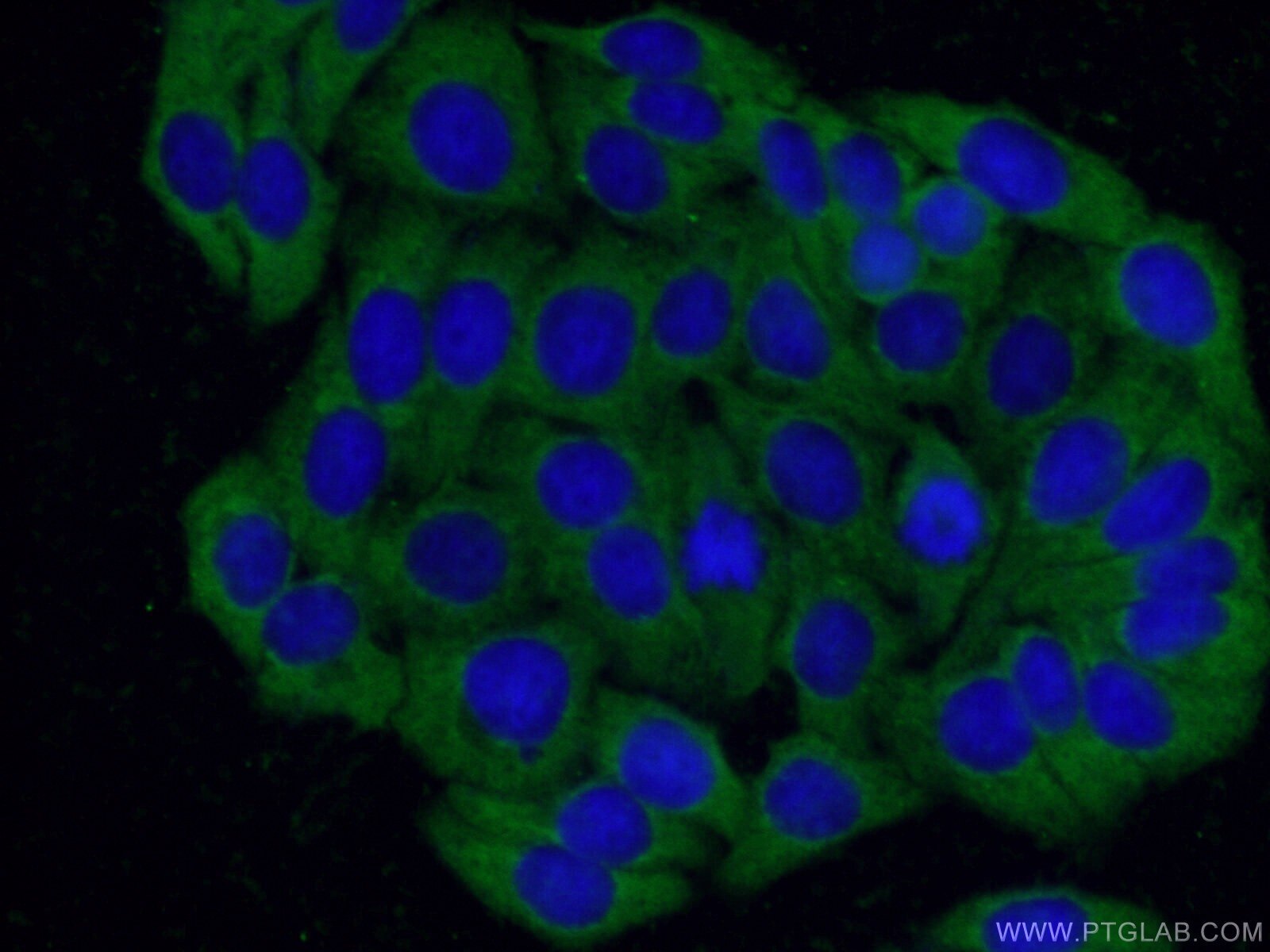- Featured Product
- KD/KO Validated
CXXC5 Polyklonaler Antikörper
CXXC5 Polyklonal Antikörper für IF, IHC, IP, WB, ELISA
Wirt / Isotyp
Kaninchen / IgG
Getestete Reaktivität
human, Maus und mehr (1)
Anwendung
WB, IP, IHC, IF, ChIP, ELISA
Konjugation
Unkonjugiert
Kat-Nr. : 16513-1-AP
Synonyme
Galerie der Validierungsdaten
Geprüfte Anwendungen
| Erfolgreiche Detektion in WB | Maushirngewebe, MCF-7-Zellen |
| Erfolgreiche IP | SH-SY5Y-Zellen |
| Erfolgreiche Detektion in IHC | humanes Prostatakarzinomgewebe Hinweis: Antigendemaskierung mit TE-Puffer pH 9,0 empfohlen. (*) Wahlweise kann die Antigendemaskierung auch mit Citratpuffer pH 6,0 erfolgen. |
| Erfolgreiche Detektion in IF | HepG2-Zellen |
Empfohlene Verdünnung
| Anwendung | Verdünnung |
|---|---|
| Western Blot (WB) | WB : 1:2000-1:10000 |
| Immunpräzipitation (IP) | IP : 0.5-4.0 ug for 1.0-3.0 mg of total protein lysate |
| Immunhistochemie (IHC) | IHC : 1:50-1:500 |
| Immunfluoreszenz (IF) | IF : 1:50-1:500 |
| It is recommended that this reagent should be titrated in each testing system to obtain optimal results. | |
| Sample-dependent, check data in validation data gallery | |
Veröffentlichte Anwendungen
| KD/KO | See 3 publications below |
| WB | See 8 publications below |
| IHC | See 1 publications below |
| ChIP | See 4 publications below |
Produktinformation
16513-1-AP bindet in WB, IP, IHC, IF, ChIP, ELISA CXXC5 und zeigt Reaktivität mit human, Maus
| Getestete Reaktivität | human, Maus |
| In Publikationen genannte Reaktivität | human, Maus, Zebrafisch |
| Wirt / Isotyp | Kaninchen / IgG |
| Klonalität | Polyklonal |
| Typ | Antikörper |
| Immunogen | CXXC5 fusion protein Ag9733 |
| Vollständiger Name | CXXC finger 5 |
| Berechnetes Molekulargewicht | 322aa,33 kDa; 227aa,24 kDa |
| Beobachtetes Molekulargewicht | 35-40 kDa |
| GenBank-Zugangsnummer | BC017439 |
| Gene symbol | CXXC5 |
| Gene ID (NCBI) | 51523 |
| Konjugation | Unkonjugiert |
| Form | Liquid |
| Reinigungsmethode | Antigen-Affinitätsreinigung |
| Lagerungspuffer | PBS mit 0.02% Natriumazid und 50% Glycerin pH 7.3. |
| Lagerungsbedingungen | Bei -20°C lagern. Nach dem Versand ein Jahr lang stabil Aliquotieren ist bei -20oC Lagerung nicht notwendig. 20ul Größen enthalten 0,1% BSA. |
Hintergrundinformationen
CXXC5 (CXXC-type zinc finger protein 5) is also named as HSPC195, RINF and TCCCIA00297.CXXC5 is a member of the CXXC-type zinc-finger protein family. CXXC5 is a short protein (322 amino acids in length) that does not have any catalytic domain, but is able to bind to DNA and act as a transcription factor and epigenetic factor through protein-protein interactions. In addition, CXXC5 is capable of regulating various signal transduction processes, including the TGF-β, Wnt and ATM-p53 pathways, thereby acting as a novel and crucial signaling coordinator. CXXC5 plays an important role in embryonic development and adult tissue homeostasis by regulating cell proliferation, differentiation and apoptosis (PMID: 30479059). CXXC5 has two isoforms of 33 kDa and 24 kDa (PMID: 25805812). CXXC5 is modified by phosphorylation after translation.
Protokolle
| Produktspezifische Protokolle | |
|---|---|
| WB protocol for CXXC5 antibody 16513-1-AP | Protokoll herunterladen |
| IHC protocol for CXXC5 antibody 16513-1-AP | Protokoll herunterladen |
| IF protocol for CXXC5 antibody 16513-1-AP | Protokoll herunterladen |
| IP protocol for CXXC5 antibody 16513-1-AP | Protokoll herunterladen |
| Standard-Protokolle | |
|---|---|
| Klicken Sie hier, um unsere Standardprotokolle anzuzeigen |
Publikationen
| Species | Application | Title |
|---|---|---|
Nat Commun A noncanonical AR addiction drives enzalutamide resistance in prostate cancer.
| ||
J Exp Med Epigenetic regulator CXXC5 recruits DNA demethylase Tet2 to regulate TLR7/9-elicited IFN response in pDCs.
| ||
Oncogene NUDT21 negatively regulates PSMB2 and CXXC5 by alternative polyadenylation and contributes to hepatocellular carcinoma suppression.
| ||
Haematologica The epigenetic regulator RINF (CXXC5) maintains SMAD7 expression in human immature erythroid cells and sustains red blood cells expansion. | ||
Sci Rep KANK1 inhibits cell growth by inducing apoptosis though regulating CXXC5 in human malignant peripheral nerve sheath tumors. | ||
Front Cell Dev Biol Down-Regulation of CXXC5 De-Represses MYCL1 to Promote Hepatic Stellate Cell Activation. |
